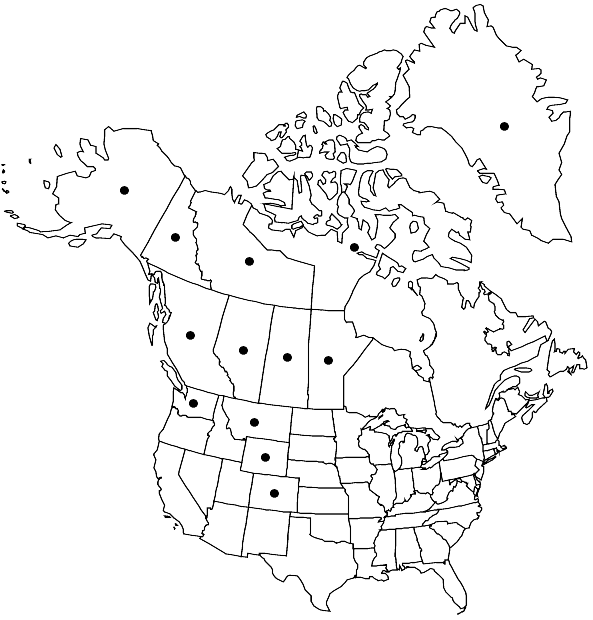Schistidium tenerum
Ill. Moss. Fl. Fennoscand., Musci, 775. 1969,.
Plants in densely compact, usually fragile (individual stems easily separated) cushions or mats, olivaceous, brownish green, or nearly black. Stems 0.5–2(–4) cm, central strand distinct. Leaves erect, usually imbricate when dry, ovate-triangular to ovate-lanceolate, keeled distally, concave proximally, (0.7)–0.9–1.5(–1.8) mm, usually unevenly 2-stratose distally; margins usually recurved, smooth, 1-stratose or 2-stratose; apices acute; costa usually long-excurrent as a spinulose-denticulate, usually decurrent, often flexuose awn, smooth; basal marginal cells quadrate or oblate, sometimes with transverse walls thicker than longitudinal walls, trigonous; distal laminal cells quadrate, ovate, or short-rectangular, 5–8 µm wide, smooth, weakly sinuose or straight. Sexual condition dioicous. Capsule dark reddish or orange-brown, cupulate or short-cylindric, 0.6–1.1 mm; exothecial cells isodiametric or elongate, usually thin-walled; stomata present; peristome patent to squarrose, 300–420 µm, orange or light brown, papillose, strongly perforated. Spores 10–14 µm, verruculose.
Phenology: Capsules mature late spring to early summer.
Habitat: Exposed to semi-shaded rock, often forms rather extensive patches, especially in and along rock crevices
Elevation: low to high elevations (0-4500 m)
Distribution

Greenland, Alta., B.C., Man., N.W.T., Nunavut, Sask., Yukon, Alaska, Colo., Mont., Wash., Wyo., Eurasia.
Discussion
The densely compact mats or cushions comprised of thin, wiry stems that readily separate once disturbed characterize Schistidium tenerum. The usually unevenly 2-stratose, ovate-triangular, small laminae tipped with long, often flexuose, spinulose-denticulate awns distinguish it from other species of the genus and similar species of Grimmia. This species is closely related to the larger S. heterophyllum, and differences between the two are discussed under that species. Probably because S. tenerum is usually sterile, many collections of it remain unidentified in collections, or identified as an undetermined species of Grimmia.
Selected References
None.